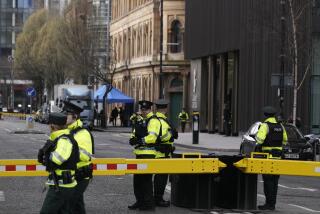Demand Over IRA Arms Dropped
- Share via
BELFAST, Northern Ireland — The perilously stalled peace process in Northern Ireland lurched back into motion Wednesday when the British government bowed to a blue-ribbon international commission and dropped its hard-line demand for the surrender of terrorist arms as a prerequisite for talks.
The reversal by British Prime Minister John Major came in response to the recommendations of a commission led by former U.S. Sen. George J. Mitchell seeking ways to destroy huge arsenals belonging to the Roman Catholic and Protestant terrorists whose violence convulsed Northern Ireland for 25 years.
Addressing Parliament in London after Mitchell made his report public here, Major said Britain still favors “decommissioning” weapons before talks but will not allow peace initiatives--symbolized by a hugely successful cease-fire now in its 17th month--to be foreclosed by the refusal of the Irish Republican Army to surrender arms.
Major proposed elections in Northern Ireland for an assembly that would mandate step-by-step decommissioning of weapons during peace talks. Preparations would begin once Sinn Fein, the political arm of the IRA, formally accepted a declaration of irrevocable democratic principles, Major said.
The British about-face effectively placed on Sinn Fein responsibility for the future of all-party talks, which have long been demanded by rebel Catholics who seek the union of Northern Ireland with the Irish Republic.
The IRA, which has not ruled out future violence, opposes elections before talks. Sinn Fein leader Gerry Adams seemed cautiously optimistic at first that the commission recommendations could break the logjam but later accused Major of swapping one prerequisite for another. “What we have in this report is the removal of preconditions. No one, including John Major, should be putting forward new conditions,” Adams said.
Major’s maneuver climaxed a dramatic day in which the commission offered both hope and hard choices to all of the actors in the tense Northern Ireland drama. The Irish government reacted positively, though chary of elections.
Unionist leaders, such as David Trimble, representing the Protestant majority among Northern Ireland’s 1.5 million people were distraught at Britain’s policy change. But they cheered the prospect of elections--possibly in April or May--that they had proposed to determine which parties in what proportions would participate in peace talks.
Mitchell, assisted by former Finnish Prime Minister Harri Holkeri and retired Canadian general John de Chastelain, spent eight weeks talking with representatives of both communities here. The commission also conferred with the British and Irish governments, which jointly sponsored it in hopes of escaping the yearlong impasse created by the British demand for at least a token surrender of arms before talks. Protestant terrorist groups agreed. The IRA refused.
The commission, Mitchell told reporters, found deep-seated popular hopes for lasting peace lamentably roiled by abiding distrust between the two communities, with people too ready to “resort to their vast inventories of historical recrimination.”
“This is a critical time in the history of Northern Ireland. The peace process will move forward, or this society could slip back to the horror of the past quarter-century,” Mitchell said, reading from the commission report.
Critically, Mitchell said, the commission also found, among the people and among those close to the paramilitaries, “nearly universal support . . . for the total and verifiable disarmament of all paramilitary organizations.”
At the same time, the commission said, “We have concluded that the paramilitary organizations will not decommission any arms prior to all-party negotiations.” Protestant terrorist bands, which embarked on their own cease-fire after the IRA’s groundbreaking one of Sept. 1, 1994, say they will surrender their weapons if the IRA does.
To circumvent the roadblock, the commission recommends decommissioning during all-party negotiations, with the pace and the scope to be determined by the parties themselves.
“Such an approach obviously represents a compromise. If the peace process is to move forward, the current impasse must be overcome. While both sides have been adamant in their positions, both have repeatedly expressed the desire to move forward,” the commission reported.
A key element of the commission recommendations addresses British and unionist concerns that the IRA would resume violence if it felt shortchanged by any political settlement. The commission recommends that all parties “affirm their total and absolute commitment” to six points.
They include pledges by the parties to employ democratic and peaceful means of resolving political differences; to bring about the total and verifiable disarmament of all paramilitary groups; to abide by any agreement reached in all-party talks; and “to renounce for themselves, and to oppose any effort by others, to use force or to threaten to use force, to influence the course or the outcome of all-party negotiations.”
More to Read
Sign up for Essential California
The most important California stories and recommendations in your inbox every morning.
You may occasionally receive promotional content from the Los Angeles Times.












